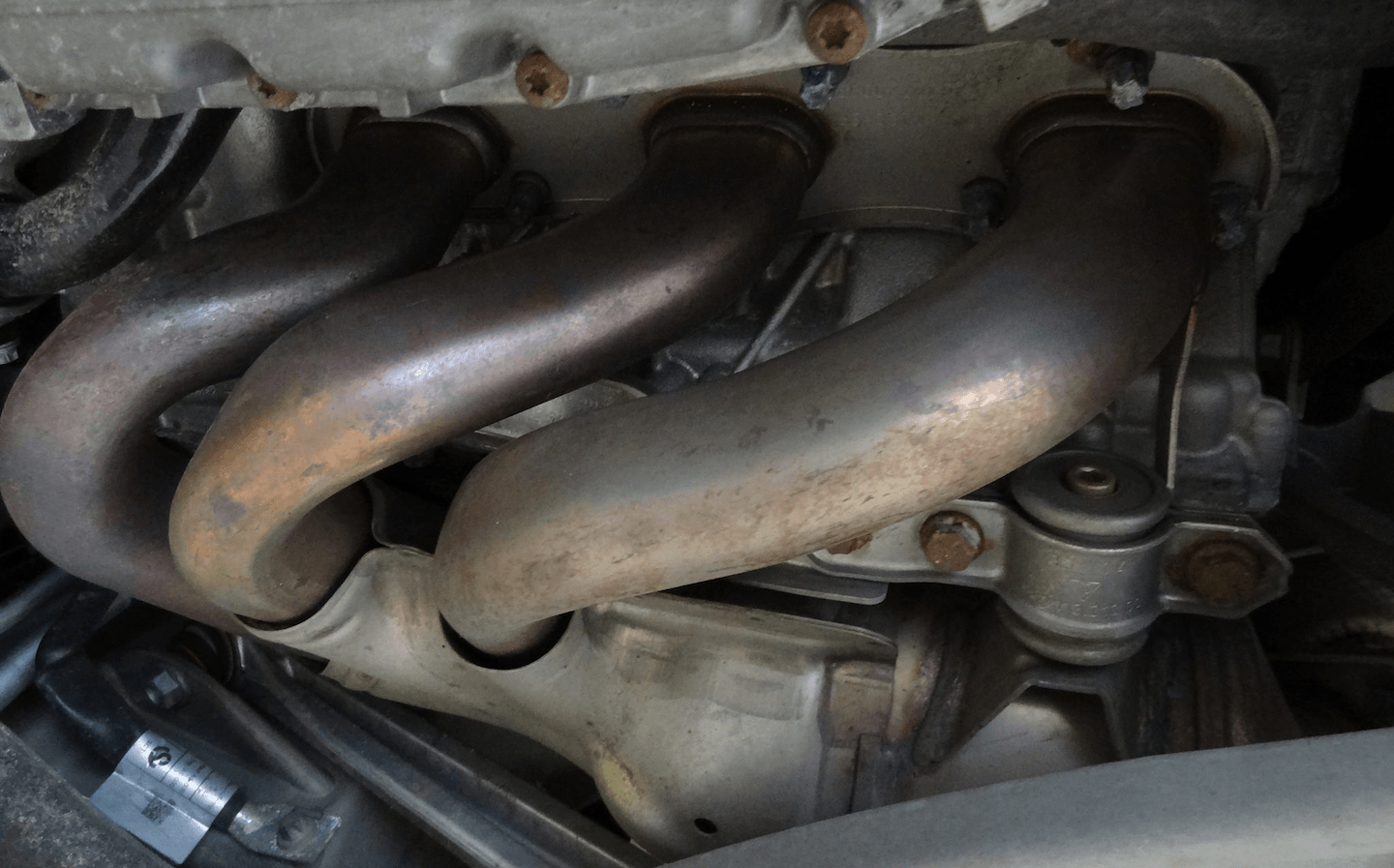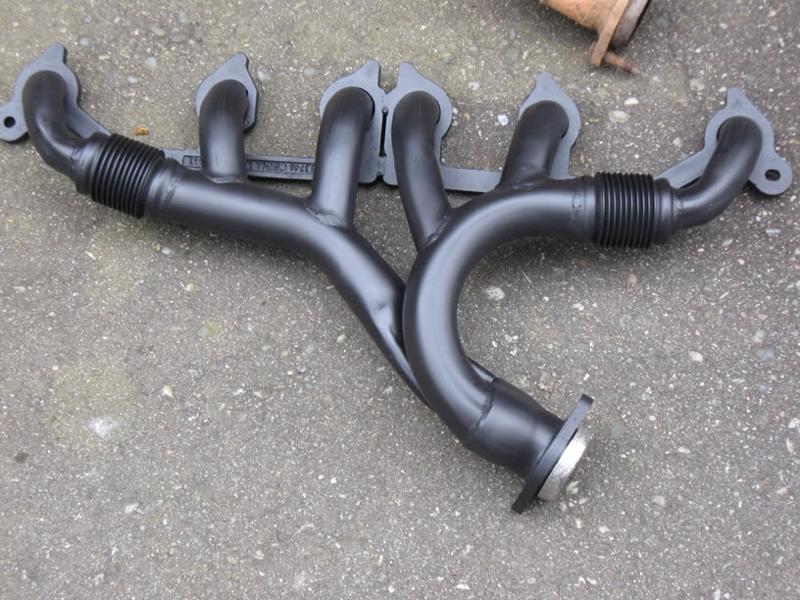A leaking exhaust manifold gasket might lead to burned exhaust valves, allowing combustion exhaust to stream back into your intake manifold. And, that causes exhaust manifold leaks. The leak might be triggered by a gasket failure, bolt failure, or even the manifold itself.
How to Tell if Your Exhaust Manifold is Leaking In The Garage with
How do i know i have an exhaust manifold leak? Finally, with expansion and contraction of the whole system, something has to give. The sound will get more rapid as you accelerate.
The most common symptoms of a leaking exhaust manifold are ticking noises, a lit check engine light, odors in the exhaust, and clear damage on the manifold itself.
The easiest and most effective way to fix a leaking exhaust manifold is to replace it entirely. An exhaust leak occurs when there is a breach in the exhaust system, allowing exhaust gases to escape before they reach the tailpipe. Identifying an exhaust leak early can prevent further damage to your vehicle. Unusual noises like a hissing or popping sound coming from the exhaust area.
An exhaust manifold leak can cause a variety of problems, including decreased engine performance, increased fuel consumption, and even engine damage. If you suspect that your vehicle has an exhaust manifold leak, it’s important to take action as soon as possible to prevent further damage. These are classic symptoms of a leaking exhaust manifold. While you may be tempted to ignore the problem until it’s time for your next oil change or tire rotation, an exhaust manifold leak can wreak havoc on your car — and, more crucially, it can be dangerous for your health.

Exhaust manifold leaks, can be caused by:
Loose or broken, bolts or studs A leak in the exhaust manifold can trigger the check engine light, especially if it affects the oxygen sensors or causes the engine to run inefficiently. A leaky exhaust manifold can lead to excessive heat buildup in the engine bay, which can potentially cause damage to surrounding components. To fix a leak on the exhaust manifold, choose between temporary and permanent fixing.
The quick fix includes applying epoxy or welding the leaking manifold and/or replacing a leaky gasket. Installing a new manifold and gasket is the best permanent solution for the problem. What are exhaust manifold leak symptoms? The most common symptom is a clicking noise that appears when you first start your car and stops once it warms up.

Learn to diagnose exhaust manifold leaks.
The gasket is an airtight seal against the head, so the gasses pass into the exhaust manifold and on to the rest of the exhaust system. The gasket prevents noxious gases and incredibly high temperatures from escaping the engine at the wrong point. Signs of exhaust manifold gasket failure. Generally, exhaust manifold gaskets are hardy items
A 2009 dodge ram 2500 with a 5.9l diesel engine has a whistling noise and lacks power under acceleration. The technician inspects and finds two broken exhaust manifold bolts on the cylinder head. Depending on your engine and type of vehicle, the exhaust manifold can either be a set of pipes or it can be a cast iron manifold assembly. Essentially the exhaust manifold takes the burned exhaust gases from the engine’s cylinders and ejects the gas through the exhaust system and out through the car's tail pipe.

This noise occurs because the exhaust gases are escaping through the leak, and the exhaust manifold leak sound can be its worst when the engine is cold.
If there’s a leak in the exhaust manifold, you might notice a strong smell of exhaust fumes inside the cabin, especially when the vehicle is idling. This can be dangerous as it may include Loss of acceleration when your vehicle leaks from the manifold or anywhere along the exhaust line, your engine may not pull the proper amount of fuel, which could cause clogs or flooding. You may notice your engine feels sluggish when you push down on the gas pedal or that it stutters before accelerating if you’re dealing with a leak.
A damaged exhaust manifold or gasket will leak exhaust fumes, leading to an exhaust smell in the engine bay or cabin. These exhaust fumes can be harmful as they contain toxic carbon monoxide. You may also notice a burning smell if the hot exhaust gas burns a plastic part or wire in the engine bay. These above manifold leak symptoms should never be shrugged off or ignored, and if you do have a leaking exhaust manifold, it’s best to not wait around to fix the issue.

The causes of an exhaust manifold issue.
Exhaust manifold leak is quite a common issue that can be a bit tedious to repair. A leaking exhaust manifold gasket might lead to burned exhaust valves, allowing combustion exhaust to stream back into your intake manifold. The leak might be triggered by a gasket failure, bolt failure, or even the manifold itself. How do i know i have an exhaust manifold leak?
The sound will get more rapid as you accelerate. The most common symptoms of a leaking exhaust manifold are ticking noises, a lit check engine light, odors in the exhaust, and clear damage on the manifold itself. The easiest and most effective way to fix a leaking exhaust manifold is to replace it entirely. An exhaust leak occurs when there is a breach in the exhaust system, allowing exhaust gases to escape before they reach the tailpipe.
Identifying an exhaust leak early can prevent further damage to your vehicle.
Unusual noises like a hissing or popping sound coming from the exhaust area. An exhaust manifold leak can cause a variety of problems, including decreased engine performance, increased fuel consumption, and even engine damage. If you suspect that your vehicle has an exhaust manifold leak, it’s important to take action as soon as possible to prevent further damage. These are classic symptoms of a leaking exhaust manifold.
While you may be tempted to ignore the problem until it’s time for your next oil change or tire rotation, an exhaust manifold leak can wreak havoc on your car — and, more crucially, it can be dangerous for your health. Exhaust manifold leaks, can be caused by: Loose or broken, bolts or studs A leak in the exhaust manifold can trigger the check engine light, especially if it affects the oxygen sensors or causes the engine to run inefficiently.
A leaky exhaust manifold can lead to excessive heat buildup in the engine bay, which can potentially cause damage to surrounding components.
To fix a leak on the exhaust manifold, choose between temporary and permanent fixing. The quick fix includes applying epoxy or welding the leaking manifold and/or replacing a leaky gasket. Installing a new manifold and gasket is the best permanent solution for the problem. What are exhaust manifold leak symptoms?
The most common symptom is a clicking noise that appears when you first start your car and stops once it warms up. Learn to diagnose exhaust manifold leaks. Signs my exhaust manifold is failing. If there is a leak in your exhaust manifold, you will certainly notice some of the signs.
Check out our list of the most common symptoms of a leaking exhaust manifold and compare them to the symptoms you have seen in your own vehicle.
Abnormal noises if your engine is louder than normal, it could be a sign Problems associated with manifold cracks and leaks. There are several problems created with exhaust manifold cracks and leaks. First, hot exhaust gases are now being vented under the hood, rather than being sent downstream through the exhaust pipe.
This can damage plastic components in the engine bay. Symptoms of an exhaust manifold leak; Reasons for an exhaust manifold leak. A leak in the manifold gasket;
How to fix an exhaust manifold leak.
The best way of identifying an exhaust manifold leak is to know how it sounds. Usually, the exhaust manifold leak sounds like air pressure coming out from the manifold area. Apart from this, there are other sounds of exhaust manifold leak as well which are following: How much does exhaust leak repair cost?* in most cases, the largest factor in the cost of repairing an exhaust leak is labor.
However, that does depend on the cost of the part. If you have a catalytic converter leak, you can probably expect to pay upwards of A visual inspection and listening to the vehicle are usually enough to detect an exhaust manifold leak. You can often find an exhaust manifold leak by listening to the vehicle and visually inspecting it.
Start the engine cold and listen for the ticking or tapping sound that signifies the presence of an exhaust leak.
Sometimes an exhaust manifold starts to leak, because a bolt or stud has broken. Exhaust manifold bolts and studs, both suffer the same fate. Consequently, getting brittle from too many, heating and cooling cycles.